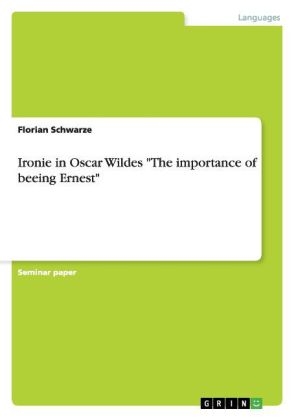
Ironie in Oscar Wildes "The importance of beeing Ernest"
Seiten
2010
|
2. Aufl.
GRIN Verlag
978-3-640-75323-9 (ISBN)
GRIN Verlag
978-3-640-75323-9 (ISBN)
- Titel nicht im Sortiment
- Artikel merken
Seminar paper from the year 2010 in the subject Didactics for the subject English - Literature, Works, grade: 2,3, University of Koblenz-Landau (Anglistik), language: English, abstract: It is impossible to imagine living without irony in our everyday life. Irony as a form of "linguistic indirectness" has become a phenomenon in recent years. It is used by, no matter what age or social group in our speaking, writing and literature. The term "irony" derives etymologically from the Greek word "eironeia" and actually means "adjustment", "escape", or especially "lack of seriousness". But another significant element is being added, which is "making fun of someone". So if you call someone a hero, who just ran away from something harmless, you do not mean it literally, you indirectly try to express the opposite. Actually you would have said, that he is a total coward. But exactly that is what makes a definition of the term "irony" so difficult, because it is not always exactly the opposite when you are ironic; sometimes it just means something else. If we now start from this explanation of the term, you could assume that something ironic is almost a lie, as someone who uses irony wants to express something else than he actually says. It is not a lie because when you lie you try your best nobody realizes your being untrue. When someone is ironic, the intention is to let the other person notice this. Thus irony is transparent where a lie is, at least, opaque. The second major difference is the intention to deceive which is constitutive for the lie, but not when you use irony. You also can not compare irony with mockery; mockery always tries to hurt someone directly, irony in contrast always is detached and uses some kind of adjustment.In this work I will try to define irony and try to find and analyze some of the ironic passages from Oscar Wilde's comedy "The Importance of Being Earnest".The eccentric Oscar Wilde, who lived from 1854 until 1900 was one of the leading representatives of the aesthetic movement of "L'art pour l'art", which tried to "aestheticize" all areas of life. Wilde, who lived the life of a perfect dandy, deliberately bended the norms of the Victorian era.In 1895, at the peak of his career, he was sentenced to two years of hard labour, because of homosexual practices. This verdict ended in his financial and social ruin. After his release Wilde emigrated to Paris where he died on the 30th Nov 1900.In his works, including "The Importance of Being Earnest", Wilde criticized the bigotry and the exaggerated morality of the English society at this time.
| Erscheint lt. Verlag | 16.11.2010 |
|---|---|
| Sprache | englisch |
| Maße | 148 x 210 mm |
| Gewicht | 54 g |
| Themenwelt | Geisteswissenschaften ► Sprach- / Literaturwissenschaft ► Anglistik / Amerikanistik |
| Geisteswissenschaften ► Sprach- / Literaturwissenschaft ► Sprachwissenschaft | |
| Sozialwissenschaften ► Pädagogik ► Schulpädagogik / Grundschule | |
| Sozialwissenschaften ► Pädagogik ► Schulpädagogik / Sekundarstufe I+II | |
| Schlagworte | Comedy • earnest • England • Ernest • gay • homosexual • homosexuel • Irony • Komödie • Oscar Wilde • OscarWilde • Sarcasm • Sarkasmus • Satire • Schwul • The importance of beeing Ernest • TheimportanceofbeeingErnest |
| ISBN-10 | 3-640-75323-2 / 3640753232 |
| ISBN-13 | 978-3-640-75323-9 / 9783640753239 |
| Zustand | Neuware |
| Haben Sie eine Frage zum Produkt? |
Mehr entdecken
aus dem Bereich
aus dem Bereich
Poetik eines sozialen Urteils
Buch | Hardcover (2023)
De Gruyter (Verlag)
59,95 €


